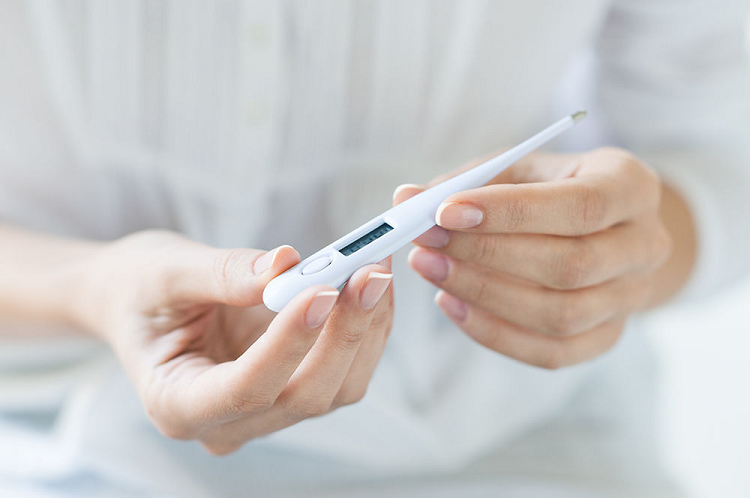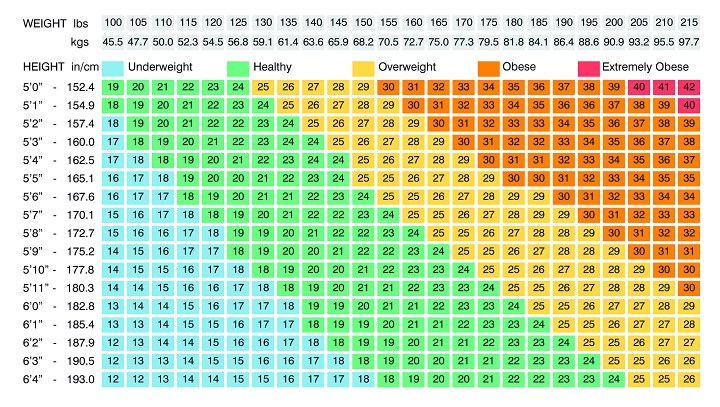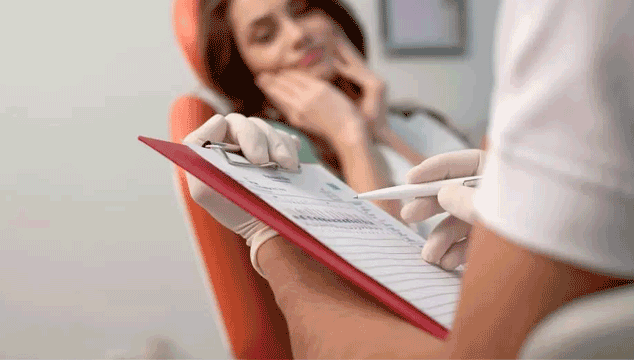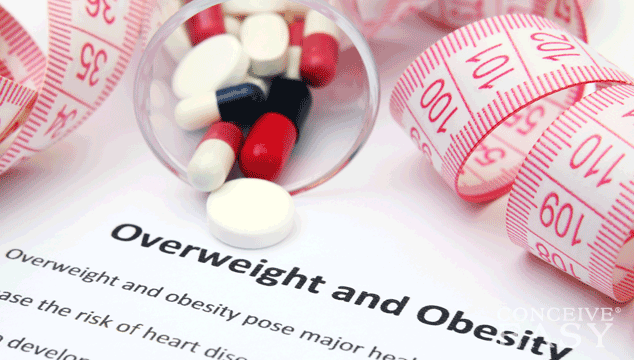![]() The information provided by our expert should not constitute a diagnosis of your condition. Always consult a medical practitioner or healthcare provider for a formal diagnosis. By making use of this content, you agree that ConceiveEasy and the expert assume no liability.
The information provided by our expert should not constitute a diagnosis of your condition. Always consult a medical practitioner or healthcare provider for a formal diagnosis. By making use of this content, you agree that ConceiveEasy and the expert assume no liability.
There can be a ton of different things that affect women’s chances of getting pregnant. There is so much to worry about, and it can be a little bit overwhelming. Claim Your 20 Free Pregnancy Tests – Click Here
This is especially true for women who are overweight and trying to conceive.
Being overweight and trying to get pregnant can come with its own set of setbacks and challenges. That’s not to say that it is impossible, however.
It is definitely possible, but there might be some specific things for women to keep in mind and remember in order for the best success. Read on to find out more on what to do if you are overweight and trying to get pregnant.

This is, perhaps, the most important question for any woman who is trying to conceive.
You have to understand that ovulation is THE most important part of the game when it comes to fertility.
Ovulation is the time of the month when the egg is released from the ovary and travels down the fallopian tubes. From there, the egg will wait to be potentially fertilized by the sperm.
However, if a woman is not ovulating, there is no possibility of getting pregnant at all. No matter how often she has sex, how healthy she is, or how much she plans.
The truth of the matter is, you don’t ovulate, you can’t get pregnant.
Luckily, there are many different ways for a woman to find out if she is ovulating. First of all, it’s important to keep in mind that just because a woman gets her period, doesn’t mean she is ovulating.
However, it is very likely that if a woman is getting her period regularly every 28 days or so, that her ovulation cycle is also normal. This is because a woman’s period can be a good indication that her hormones are working correctly. It is always a good idea to check, however, because sometimes women who have their periods still have ovulation problems.
![]() Ovulation predictor test – One of the most common ways to check for ovulation is using an at home ovulation predictor test. These test are usually very inexpensive, and use a woman’s urine to check to see how close she is to her LH surge, which is usually what precedes ovulation. They can usually predict ovulation when they are used regularly, although it might take women some time to get the hang of them and to figure out when they are getting a positive result.
Ovulation predictor test – One of the most common ways to check for ovulation is using an at home ovulation predictor test. These test are usually very inexpensive, and use a woman’s urine to check to see how close she is to her LH surge, which is usually what precedes ovulation. They can usually predict ovulation when they are used regularly, although it might take women some time to get the hang of them and to figure out when they are getting a positive result.
![]() Cervical mucus & position – Another option for tracking ovulation include tracking both cervical mucus and cervical position. Getting in tune with your body and learning the differences in cervical mucus, from fertile quality CM that looks like egg whites, to dry or scant CM can predict ovulation. Learning to feel your cervical position throughout your cycle will also tell you much.
Cervical mucus & position – Another option for tracking ovulation include tracking both cervical mucus and cervical position. Getting in tune with your body and learning the differences in cervical mucus, from fertile quality CM that looks like egg whites, to dry or scant CM can predict ovulation. Learning to feel your cervical position throughout your cycle will also tell you much.
![]() Basal body temperature – Another option is charting basal body temperature, although that one might take a few months to start seeing a real pattern.
Basal body temperature – Another option is charting basal body temperature, although that one might take a few months to start seeing a real pattern.

As you can see, there are tons of different ways that you can track your fertility and find out if you are ovulating or not. That is a good first step when it comes to fertility tracking and finding out the underlying issue.

One of the most common issues that overweight women face when they are trying to conceive is hormonal issues. Hormonal issues are very common in overweight women, since fat cells actually change the body’s metabolism.
These hormone issues can lead to problems like PCOS, or PolyCystic Ovarian Syndrome, which is basically a hormonal imbalance where the body produces too many male hormones.
This condition is very common and can also lead to ovarian cysts, as well as weight gain, increased facial hair, and lots of trouble with getting pregnant. There are lots of problems that hormonal imbalances can cause, and for many women, being overweight may be just the culprit.
If you are overweight and you are experiencing fertility difficulties, it’s definitely a good idea to take a look and see if perhaps your weight might be to blame for the issues that you have been having.

In order to know how much your weight could be affecting your fertility, it’s a good idea for a woman to know her BMI, or Body Mass Index. There is a chart that doctors go by to determine a person’s BMI, or you can use one of many online calculators or smart phone apps.
A BMI score of between 19 and 25 is considered to be ideal. Obesity is described as a BMI of more than 30, and people with a BMI of over 35 are considered morbidly obese.
The higher your BMI, the more likely it is that your weight will cause some health problems for you, and this is likely to include fertility problems as well. It’s definitely a good idea to know your BMI from the start when you are trying to conceive, since this will give you a good idea of what you are working with and what kinds of changes you will need to make.

(For the record, it’s also a good idea to know your partner’s BMI, as well, since male fertility is closely related to weight too, not just female fertility!)

In short, yes.
Losing weight is a great idea for women who are overweight and are trying to get pregnant or even thinking about getting pregnant.
The best news is that it doesn’t even have to be a lot to see a big change.
Experts say that women who are not ovulating because of their weight can start to see a big change by losing as little as 2 to 5 percent of their body weight. Most women see a difference after losing around 5 to 10 pounds. This can be enough of a weight loss to “reset” the body’s metabolism and get women back to ovulating normally.
This is really good news for women who might have been discouraged and had the mindset that it was “all or nothing” when it comes to weight loss. The proof is in the pudding, when it comes to fertility and weight loss, every little bit helps!

It can be a little overwhelming at first when a woman decides that she needs to lose weight in order to give her fertility a boost. The good news, as we mentioned before, is that there doesn’t always have to be a dramatic weight loss in order to see big results when it comes to fertility.
A little bit goes a long way, and for most of us, losing a little bit of weight is generally not that hard.
The main thing is that you put your head in the game, so to speak, and just really focus on where you want to be and the goals that you want to achieve. There are several things to do that can help to jump start weight loss if you are just starting out.
![]() First things first, if you are ready to start losing weight, you better be eating at home. That’s right, restaurants are notorious for their high calorie, unhealthy food choices. Just staying away from restaurants and eating at home instead can go a long way towards boosting weight loss.
First things first, if you are ready to start losing weight, you better be eating at home. That’s right, restaurants are notorious for their high calorie, unhealthy food choices. Just staying away from restaurants and eating at home instead can go a long way towards boosting weight loss.
![]() The same can be said about drinking water. The more water in your body when you are trying to lose weight, the better. Water can flush out unhealthy toxins, help you feel full and stay hydrated. If you are trying to lose weight, definitely make sure that you are getting enough water.
The same can be said about drinking water. The more water in your body when you are trying to lose weight, the better. Water can flush out unhealthy toxins, help you feel full and stay hydrated. If you are trying to lose weight, definitely make sure that you are getting enough water.
![]() Another good tip is to stay away from processed foods, sugary snacks, and other unhealthy foods, since they are not going to help in the weight loss process. The main thing is going to be eating as much whole foods as possible when it comes to weight loss and that will be very helpful.
Another good tip is to stay away from processed foods, sugary snacks, and other unhealthy foods, since they are not going to help in the weight loss process. The main thing is going to be eating as much whole foods as possible when it comes to weight loss and that will be very helpful.

It can be easy to point out the things that we should not eat in order to lose weight, but it can be a little bit harder to know what we SHOULD be eating when it comes to losing weight and being healthier.
Here’s what you should know. Fruits and veggies, of course, are a great choice, the more, the better! Organic is best if you have it available and can afford it, but if not, that’s okay too.
When it comes to dairy products, doctors actually say that full fat dairy products are the best when women are trying to conceive, so don’t opt for the low fat versions (but do take it easy and don’t go off and eat a pint of Ben & Jerry’s every night either!).
When it comes to grains, you want to opt for whole grains, so pick out whole wheat bread, whole wheat pasta and brown rice. Also make sure to choose lean proteins like fish and chicken, and remember you can get protein from beans and lentils as well.
Simply paying attention to what you put into your body can go a long way towards not only weight loss but overall health as well.

As most of us know, the majority of weight loss comes from changing the diet.
It really is all about what you eat. Eat less and eat healthy, and you’ll lose weight.

Experts say that weight loss is 80% diet and 20% exercise, so you will definitely see a big change if you simply start eating right. However, exercise is important as well, since it helps with weight loss, overall strength and health.
Don’t worry, though. Exercise doesn’t have to be running marathons or lifting weights heavier than your body seven days a week.
Start small when it comes to working out, and build up your endurance. Take a walk in the evenings, run around the yard with your dog or kids, or go on a weekend bike ride.
Yoga and swimming are also great ways to get some exercise as well as stress relief, which can be a huge benefit to being active. Whatever you choose to do, it doesn’t have to be too intense or too crazy. The fact that you are getting out there and being active is the first step, so getting that done is a big deal!

It’s very important to ask yourself about your medical issues and also your family history when you are trying to get pregnant, and even more so if you are overweight. Getting pregnant is not always easy, and overweight women often have more problems to contend with.
For example, it’s much more likely for an overweight woman to have problems like gestational diabetes and gestational hypertension during her pregnancy. These issues can not only cause problems for the pregnant woman but also for her unborn baby as well.
It’s also important to note that a woman who is overweight is more than twice as likely to suffer a miscarriage in comparison to a woman who is a normal weight. These are very real risks and are important things to remember if you are trying to get pregnant and you are overweight.

The first and most important step when you are trying to get pregnant and you are overweight is to see a doctor. Your doctor can give you some real insight into what is going to be the best option for you moving forward.

For example, your doctor can measure your height and weight and tell you how much weight would be a good idea for you to lose before trying to conceive. Your doctor can also tell you if you have any medical conditions or anything in your family medical history that would indicate a problem when it’s time to try to conceive.
Doctors are great for recommending diet plans and can even help to put you on a great prenatal vitamin so that you and your baby will both be protected in the event that you do get pregnant. Many women are a little bit nervous about seeing a doctor when they are overweight and trying to conceive, but doctors can really be a great source of help.
Definitely don’t delay and make an appointment with your family doctor so that you can get the advice you need to help you when you are ready to start a family.










Comments